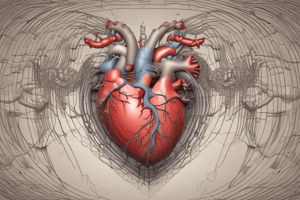Podcast
Questions and Answers
What defines the four phases of the cardiac cycle?
What defines the four phases of the cardiac cycle?
- P wave and QRS complex in the electrocardiogram
- Rising and falling of the atrial pressure curve
- Opening and closing of the cardiac valves (correct)
- Contraction and relaxation of the heart muscles
What causes the P wave in the electrocardiogram?
What causes the P wave in the electrocardiogram?
- Initiation of contraction of the ventricles
- Spread of depolarization through the atria (correct)
- Electrical depolarization of the ventricles
- Spontaneous generation of an action potential in the sinus node
What initiates contraction of the ventricles in the cardiac cycle?
What initiates contraction of the ventricles in the cardiac cycle?
- Closing of the cardiac valves
- Rising of the atrial pressure curve
- Electrical depolarization of the ventricles (correct)
- Spontaneous generation of an action potential in the sinus node
Which wave in the electrocardiogram marks the onset of ventricular systole?
Which wave in the electrocardiogram marks the onset of ventricular systole?
During which phase of the cardiac cycle does the heart fill with blood?
During which phase of the cardiac cycle does the heart fill with blood?
What is the period of rapid ejection during ventricular contraction called?
What is the period of rapid ejection during ventricular contraction called?
What causes the v wave in the atria?
What causes the v wave in the atria?
What happens during the period of isovolumic or isometric relaxation?
What happens during the period of isovolumic or isometric relaxation?
What is the function of the A-V valves?
What is the function of the A-V valves?
What causes the c wave in the atria?
What causes the c wave in the atria?
What causes the first heart sound?
What causes the first heart sound?
Why is the second heart sound shorter in duration than the first heart sound?
Why is the second heart sound shorter in duration than the first heart sound?
What is the mechanism behind the third heart sound?
What is the mechanism behind the third heart sound?
How does mitral regurgitation affect heart sounds?
How does mitral regurgitation affect heart sounds?
What condition creates a nozzle effect during systole, leading to intense vibration and a loud murmur?
What condition creates a nozzle effect during systole, leading to intense vibration and a loud murmur?
Flashcards are hidden until you start studying



